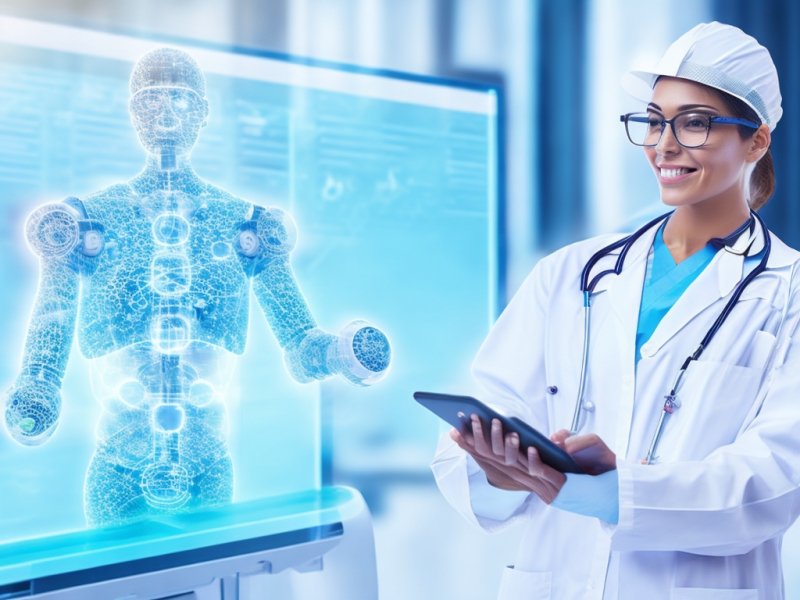
Introduction:
Artificial Intelligence (AI) has emerged as a powerful tool that is transforming various industries, and healthcare is no exception. With its ability to analyze vast amounts of data, identify patterns, and make predictions, AI is revolutionizing healthcare delivery. From diagnosis and treatment to patient care and administrative tasks, AI is reshaping the healthcare landscape, improving outcomes, and enhancing efficiency. In this blog, we will explore the significant role of artificial intelligence in revolutionizing healthcare delivery.
1. Precision Diagnostics:
One of the most promising applications of AI in healthcare is precision diagnostics. AI algorithms can analyze medical images, such as X-rays, CT scans, and MRIs, with remarkable accuracy, helping detect and diagnose diseases at an early stage. Machine learning models can quickly identify subtle abnormalities that may go unnoticed by human eyes, reducing the chances of misdiagnosis and enabling timely interventions. AI-powered diagnostics can expedite the diagnosis process, leading to faster treatment decisions and improved patient outcomes.
2. Personalized Treatment:
AI algorithms can leverage patient data, including medical records, genetic information, and lifestyle factors, to develop personalized treatment plans. By considering a patient's unique characteristics and medical history, AI can predict the effectiveness of different treatment options and recommend the most suitable course of action. This personalized approach helps optimize treatment outcomes, minimize adverse reactions, and enhance patient satisfaction. AI-powered systems can also monitor patients' responses to treatment in real-time and make adjustments accordingly, providing continuous care and improving therapeutic outcomes.
3. Predictive Analytics:
AI algorithms excel at analyzing large volumes of data and identifying patterns that humans might overlook. This capability is particularly valuable in predictive analytics, where AI can forecast disease progression, identify individuals at high risk of developing certain conditions, and estimate the likelihood of treatment success. By leveraging historical data and continuously updating models with new information, AI can provide clinicians with valuable insights for proactive decision-making, enabling early interventions, and preventing adverse events.
4. Robotic Surgery and Assistance:
AI is driving advancements in surgical procedures through the use of robotic systems. Robotic surgery allows for greater precision, control, and flexibility, enhancing surgical outcomes and reducing the risk of complications. AI-powered robots can analyze real-time data during surgery, provide surgeons with feedback, and even perform certain tasks autonomously, assisting healthcare professionals in complex procedures. Additionally, AI can guide surgeons by providing virtual simulations, helping them plan surgeries and practice techniques, leading to improved surgical accuracy and patient safety.
5. Virtual Assistants and Chatbots:
AI-powered virtual assistants and chatbots are transforming the patient experience and streamlining healthcare delivery. These intelligent systems can provide 24/7 support, answer patient queries, offer self-care advice, and triage cases based on symptom analysis. By automating routine tasks and reducing the burden on healthcare providers, virtual assistants and chatbots enhance operational efficiency, improve access to healthcare, and free up valuable time for clinicians to focus on critical patient care.
6. Administrative Efficiency:
AI is also revolutionizing the administrative aspects of healthcare delivery. AI-powered systems can automate tasks such as appointment scheduling, medical coding, and billing, reducing administrative burdens and minimizing errors. Natural Language Processing (NLP) algorithms enable AI systems to extract relevant information from medical records, facilitating documentation and enabling seamless information exchange between healthcare providers. These administrative efficiencies contribute to cost savings, streamlined workflows, and enhanced overall healthcare delivery.
Conclusion:
Artificial intelligence is transforming healthcare delivery by enhancing diagnostic accuracy, enabling personalized treatments, facilitating predictive analytics, supporting surgical procedures, improving patient engagement, and streamlining administrative tasks. As AI continues to advance, it holds tremendous potential to revolutionize healthcare, leading to improved patient outcomes, increased efficiency, and ultimately, a healthier society. By embracing AI technologies responsibly and integrating them into healthcare systems, we can harness their power to drive positive change and shape the future of healthcare delivery.
Share This News